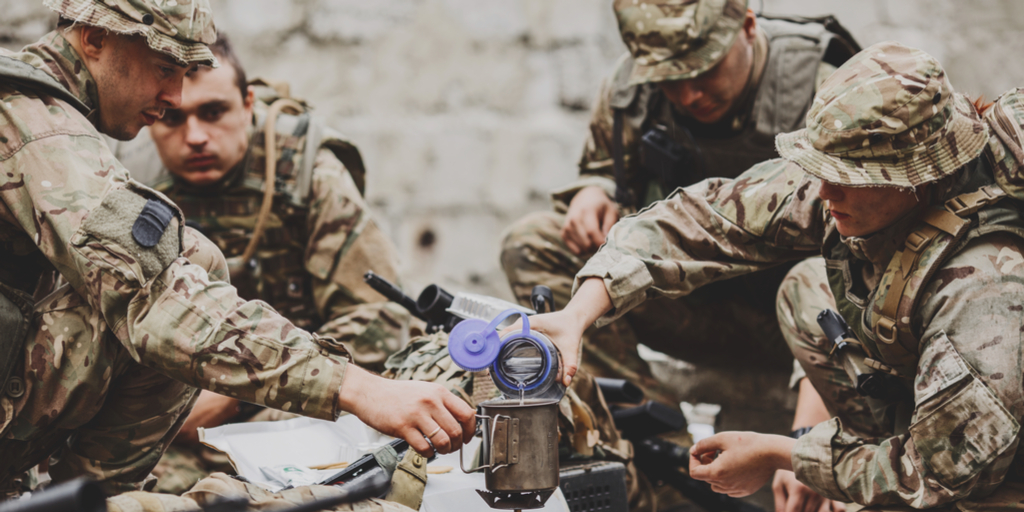Clint Eastwood is still at work giving us stories about civic virtue and examples of a necessary American stoicism.
Men Searching for Their Lost Tribe
Recently an old friend of mine contacted me on Facebook. He was checking in to see about my mother, who suffers from dementia. He was also feeling nostalgic about our 1970s childhood in Maryland — the summers at the pool, the skateboarding, the snowball fights, the girls we had crushes on. He and I started comparing notes on the characters in the old neighborhood: the athletes, the heavy metal guitarist nicknamed “Wino” who lived next door to me, the dentist who gave out toothbrushes every Halloween, and the TV anchor who covered the Apollo moon shots. My friend recalled a spot where one of us had wiped out on a mini-bike. “Our blood is on those streets,” I said, using mock melodrama. My friend replied with seriousness: “That was our tribe.”
His comment brought to mind Sebastian Junger’s 2016 book Tribe: On Homecoming and Belonging. Tribe tackles the crisis of modern manhood. The book argues that modern men are adrift because peace, technology, and wealth have broken down the ability to form tribes, which are often the result of coming together to deal with disasters. Tribes, like the Native Americans before Columbus, give people a sense of purpose and belonging. Junger revisited the theme recently in a piece about “the anthropology of manhood” that ran in National Review.
It’s an insightful theory that nonetheless, at least as presented by Junger, has some deep flaws.
Junger’s argument centers around military veterans, who owe their distress not only to traumatic experiences during their deployments, but also to the alienation they feel when they return. American society offers these men no close-knit family, or tribe, the way the military does. As a reviewer in The Guardian put it:
With its toxic politics, yawning rich-poor divide and racial tension, the US has strayed so far from the egalitarianism, self-sacrifice and solidarity that ensured the survival of our hominid ancestors that it now takes the extremes of war and disaster to spark such values back into life.
Junger notes an interesting fact: while the media often portrays many war veterans as broken or disabled by their experience, many of the warriors actually miss the camaraderie and thrill of battle. I discovered this when I recently interviewed Army Chaplain Justin Roberts, who served in Afghanistan and directed the documentary No Greater Love. I noted to Roberts that a couple of the soldiers interviewed in No Greater Love described the mad rush of combat, an adrenaline high that they miss when they return home.
Like Junger, Roberts documented not only the trauma of battle, but the exhilaration. “You don’t really realize the physiological effect,” Roberts told me. He recalled that when he retuned from Afghanistan he “was really craving” a fist fight. He finally realized that he wasn’t craving the fight, but the adrenaline that comes with it. “You get that rush. I couldn’t find it at home.” Roberts noted that’s why so many returning soldiers buy motorcycles and engage in other physically and emotionally charged hobbies.
“As awkward as it is to say,” Junger writes in Tribe, “part of the trauma of war seems to be giving it up.” He goes on: “If war were purely and absolutely bad in every single aspect and toxic in all its effects, it would probably not happen as often as it does.” Junger then observes that “in addition to all the destruction and loss of life, war also inspires ancient human virtues of courage, loyalty and self-sacrifice that can be utterly intoxicating to the people who experience them.”
Junger presents two options for modern men — the thrill and bond of battle or a soul-deflating life of dull jobs and suburban ennui. This excludes the possibility of a middle ground. Between the adrenaline charge of combat and the banality of work, boys and young men used to experience what might be called “mini-traumas.” As my childhood friend recalled to me, our lives as boys and then young men were punctuated by small disasters that were part of being a tribe. And yet we were not left with serious PTSD.
Guys wiped out on skateboards, nearly drowned in the creek, got beaned with baseballs and bitten by dogs, were bloodied up in fights, dislocated shoulders, had their hearts broken. These common experiences are nothing comparable to war, of course, but in the age before the digital revolution would keep kids inside and helicopter parenting prevented youngsters from getting hurt, kids learned how to deal with pain, take care of each other when adults were not around, and form deep bonds — all without being seriously traumatized. It’s frequently noted that kids don’t play outside anymore, but I’m not sure the true devastation of this is appreciated. As a kid in Maryland, my friends became a second family, people to depend on in case something life-threatening occurred. We steered each other out of riptides, took keys away if there had been too many beers, and encouraged each other to stay in the game after minor injuries, or to keep pedaling when we had ridden our bikes miles too far from home (there were no cell phones). That kind of small group inter-reliance used to be carried into adulthood, making it easier to form teams to deal with problems. Additionally, our outside adventures frequently led to dangerous situations, giving us an appreciation for pain and awareness of what violence is like that many kids today don’t really have.
In Tribe, Junger writes about growing up in a comfortable Belmont, Massachusetts, where he claims nothing ever happened: “I’d grown up in a Boston suburb where people’s homes were set behind deep hedges or protected by huge yards and neighbors hardly knew each other. And they didn’t need to: nothing ever happened in my town that required anything close to a collective effort.” As a young man Junger says he longed for “a hurricane or a tornado or something that would require us all to band together to survive. Something that would make us feel like a tribe.” His ideas in this respect are reminiscent of Walker Percy’s, but with less sense of the dangers.
Junger was born in 1962. He and I are the same generation, and while there is some truth to what he says about the boredom of the suburbs, in the one I was raised in there was often quite a bit going on: baseball games, block parties, dances, and all the summer adventures that boys have when they are out on their bikes looking for excitement. There were also constant situations that required the collective effort that Junger longs for. After one blizzard, some friends and I shoveled out the single mother who lived at the top of a long driveway. When someone was sick a neighbor would drive to the store for cokes and medicine. One night a neighbor came to our house in tears because her dog wouldn’t get up. The animal was fifteen, and I knew when I saw him in the backyard that he didn’t have much time left. I picked up and placed him in the back of her car, but he died shortly after getting to the vet. When cars broke down, neighbors picked each other up. These weren’t responses to invasions from a hostile country or the piecing of lives back together after a natural disaster, but rather the everyday community activities that bring and keep people together.
In a way, Junger’s longing for disaster is an easy way out. It’s a cinematic nightmare that in its abstraction is easier to celebrate than the daily work of building a community. The kind of calamity that Junger longs for can destroy lives as much as bring them closer. As one critic of Junger’s pointed out, in much of the world something dangerous is always happening, and those catastrophes are as likely to break tribal bonds as form them.
Junger is on to something quite real in Tribe and his piece in National Review, but his reductive reasoning reduces the potency of his argument. In his National Review essay, Junger argues that our evolutionary and biological imperatives override our spiritual or moral sides:
Men … have been programmed by the implacable math of evolution to impregnate women and keep moving; their reproductive potential is limited only by the number of sexual partners they have. That makes fatherhood a poor measure of manhood; plenty of good men don’t have children, and plenty of bad fathers have made enormous sacrifices for their community or their nation. So in our modern age, how does a man demonstrate his worthiness — his manhood — if he has no children to raise and no enemy to fight?
Leaving aside the possibility that any communal or national self-sacrificing that bad fathers accomplish can be outweighed by the damaged kids they usher into the tribe — kids that are most often bullies without empathy — there’s an answer to Junger’s question. There are plenty of enemies to fight in the world, and they’re not all in the hills of Afghanistan. They are the enemies of loneliness, illness, and despair that come to all tribes, modern or not. When my mother was diagnosed with dementia and I became her primary caretaker, a lot of my dreams were put on hold, including going to Hawaii to see the childhood friend who had contacted me on Facebook. I soon discovered that other members of my tribe also had parents who are now elderly and enjoy a visit from someone like me that they had watched grow up. Making the rounds a couple times a week to check in on them shows it doesn’t take a fire fight or a hurricane to become what the men who were leaders in our tribe growing up in Maryland taught us to be, or at least try to be. In the words of the Jesuit motto of my high school, we should be men for others.



